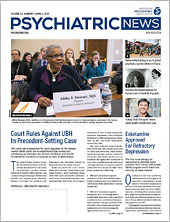The emerging field of psychodynamic psychiatry springs from psychoanalytic thought, academic psychiatry, academic psychology, and neuroscience and is built on the premise that any treatment a patient requires will be more effective if the clinician understands the developmental experiences that have affected the patient’s psychology, affects, and behavior.
Experts in a Presidential Session titled “Advances in Psychodynamic Psychiatry” will provide guidance on the practical application of psychodynamic principles to enhance treatment in both the long and short terms. The session will be presented by the American Academy of Psychodynamic Psychiatry and Psychoanalysis (AAPDPP) on Monday, May 20.
“The psychiatrist who knows about the individual’s childhood development to adulthood and experiences with trauma such as poverty, homelessness, and physical or sexual abuse can understand the whole patient more clearly. The psychodynamically aware psychiatrist can understand severely ill patients who have not responded to multiple medication treatments and figure out what interventions should be used next. The psychiatrist who is aware of the patient’s cultural and religious beliefs will be able to make a better alliance with the patient,” session chair Jennifer Downey, M.D., told Psychiatric News. She is a clinical professor of psychiatry at Columbia University College of Physicians and Surgeons and AAPDPP’s immediate past president.
“This is important because if the patient doesn’t feel understood or see the value of the treatment, he or she will not participate,” she continued. “Overall, the psychodynamically aware clinician will be more effective in enlisting the patient to engage in the treatment process. This symposium will provide psychiatrists with critical information about how to take a developmental history, establish rapport with the patient, and use events in the treatment to advance the patient’s improvement. It will also provide understanding of how Axis II disorders and other personality factors can be addressed in psychiatric treatment, even if it is not long term.”
Joanna E. Chambers, M.D., an associate professor of clinical psychiatry at Indiana University School of Medicine, will begin the symposium with a discussion of the neurobiology of attachment experiences in early life and how these may affect adult psychiatric difficulties.
Richard C. Friedman, M.D., a clinical professor of psychiatry at Weill Cornell Medical School and lecturer in psychiatry in the Columbia University Department of Psychiatry, will present various transdiagnostic aspects of treatment with very ill psychiatric patients.
Cesar Alfonso, M.D., an associate clinical professor of psychiatry in the Columbia University Department of Psychiatry, will present psychodynamic psychiatry approaches to vulnerable populations such as the elderly and survivors of intimate partner violence.
Andrew Gerber, M.D., medical director and president of Silver Hill Hospital in New Canaan, Conn., will then discuss why a focus on meaning helps psychiatrists navigate the relationship between brain and mind.
Finally, APA Secretary Philip Muskin, M.D., M.A., a professor of psychiatry and senior consultant in consultation-liaison psychiatry at Columbia University Medical Center, will provide insight based on his experience with using psychodynamic knowledge and techniques in rapid, medical team–based interventions in a general hospital setting. ■
“Advances in Psychodynamic Psychiatry” will be held on Monday, May 20, from 1 p.m. to 4 p.m.

